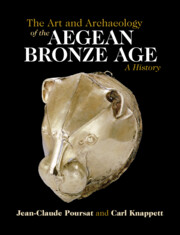Book contents
- The Art and Archaeology of the Aegean Bronze Age
- The Art and Archaeology of the Aegean Bronze Age
- Copyright page
- Contents
- Figures
- Introduction
- Part I Aegean Neolithic Art
- Part II The Art of the Aegean Early Bronze Age
- Part III Aegean Art in the Cretan First Palace Period
- Part IV Aegean Art in the Second Palace Period
- Chapter 19 Artworks in Context
- Chapter 20 Aegean Architecture in the Second Palace Period
- Chapter 21 Aegean Wall Painting
- Chapter 22 Minoan Glyptic
- Chapter 23 Artworks in the Round
- Chapter 24 Other Artworks (Stone, Faience, Ivory, Metal, and Textile)
- Chapter 25 Pottery Production
- Part V Aegean Art in the Cretan Second Palace Period
- Part VI Aegean Art in the Final Palatial Period of Knossos
- Part VII Aegean Art of the Mainland Mycenaean Palatial Period
- Part VIII Aegean Art at the End of the Bronze Age
- Afterword Aegean Art Through Forgers’ Eyes
- References
- Index
- Plate Section (PDF Only)
- References
Chapter 20 - Aegean Architecture in the Second Palace Period
from Part IV - Aegean Art in the Second Palace Period
Published online by Cambridge University Press: 19 May 2022
- The Art and Archaeology of the Aegean Bronze Age
- The Art and Archaeology of the Aegean Bronze Age
- Copyright page
- Contents
- Figures
- Introduction
- Part I Aegean Neolithic Art
- Part II The Art of the Aegean Early Bronze Age
- Part III Aegean Art in the Cretan First Palace Period
- Part IV Aegean Art in the Second Palace Period
- Chapter 19 Artworks in Context
- Chapter 20 Aegean Architecture in the Second Palace Period
- Chapter 21 Aegean Wall Painting
- Chapter 22 Minoan Glyptic
- Chapter 23 Artworks in the Round
- Chapter 24 Other Artworks (Stone, Faience, Ivory, Metal, and Textile)
- Chapter 25 Pottery Production
- Part V Aegean Art in the Cretan Second Palace Period
- Part VI Aegean Art in the Final Palatial Period of Knossos
- Part VII Aegean Art of the Mainland Mycenaean Palatial Period
- Part VIII Aegean Art at the End of the Bronze Age
- Afterword Aegean Art Through Forgers’ Eyes
- References
- Index
- Plate Section (PDF Only)
- References
Summary
The period of the second palaces on Crete is one of intense architectural activity, both on Crete and on the main Aegean islands. We know more of Minoan and Cycladic architecture from this period than from the entire preceding period. The fact that most sites were destroyed once and for all c.1450 bc, without reoccupation, has facilitated their study. New building programmes testify to the level of economic prosperity; they also tally with the transformations we have already highlighted in social and administrative organisation.
True innovations in building techniques and plans are actually few in comparison to the preceding period: but the architects of the palaces and major villas invent a new monumental style and formalise the innovations of the Middle Bronze Age.
- Type
- Chapter
- Information
- The Art and Archaeology of the Aegean Bronze AgeA History, pp. 139 - 168Publisher: Cambridge University PressPrint publication year: 2022

